Entry-Level Real Estate Agent Cover Letter
Dear [Hiring Manager's Name],
I am writing to express my strong interest in the Real Estate Agent position at [Company Name]. As a recently licensed real estate professional with a passion for helping clients find their dream properties, I am excited about the opportunity to contribute to your team's success.
During my pre-licensing coursework and subsequent preparation, I developed a solid foundation in real estate principles, property valuation, contract negotiation, and local market analysis. I am particularly drawn to [Company Name] because of your reputation for mentoring new agents and your commitment to providing exceptional client service.
My background in [previous field/experience] has equipped me with valuable transferable skills including client relationship management, attention to detail, and strong communication abilities. I am a self-motivated individual who thrives in competitive environments and understands the importance of building lasting relationships in this industry.
I am eager to bring my enthusiasm, fresh perspective, and willingness to learn to your team. I would welcome the opportunity to discuss how my dedication and drive can contribute to [Company Name]'s continued success.
Thank you for considering my application. I look forward to speaking with you soon.
Sincerely,
[Your Name]
[Your Phone Number]
[Your Email Address]
Experienced Real Estate Professional Cover Letter
Dear [Hiring Manager's Name],
With over [X] years of proven success in residential and commercial real estate, I am writing to apply for the Senior Real Estate Agent position at [Company Name]. My track record of consistently exceeding sales targets and building a loyal client base makes me an ideal candidate for this role.
Throughout my career, I have closed over [X] transactions totaling $[X] million in sales volume. My expertise spans multiple property types, including single-family homes, luxury estates, and investment properties. I have consistently ranked in the top [X]% of agents in [region/company], demonstrating my ability to thrive in competitive markets.
What sets me apart is my comprehensive approach to client service. I leverage cutting-edge marketing strategies, including professional staging, virtual tours, and targeted social media campaigns, to maximize property exposure. My negotiation skills have resulted in favorable outcomes for both buyers and sellers, often securing deals that exceeded client expectations.
I am particularly impressed by [Company Name]'s innovative approach to real estate and your commitment to professional development. I am confident that my experience, industry connections, and entrepreneurial mindset would make me a valuable addition to your team.
I would welcome the opportunity to discuss how my expertise can contribute to your organization's growth objectives. Thank you for your consideration.
Best regards,
[Your Name]
[Your Phone Number]
[Your Email Address]
Real Estate Broker Manager Cover Letter
Dear [Hiring Manager's Name],
I am writing to apply for the Broker Manager position at [Company Name]. With [X] years of experience in real estate and [X] years in leadership roles, I have a proven track record of building high-performing teams and driving office profitability.
In my current role as [Current Position] at [Current Company], I have successfully managed a team of [X] agents, increasing office revenue by [X]% over [X] years. My leadership philosophy centers on providing comprehensive training, fostering a collaborative culture, and implementing systems that enable agents to maximize their potential while maintaining compliance with all regulatory requirements.
My accomplishments include developing and executing strategic business plans, recruiting top talent, implementing innovative marketing initiatives, and maintaining a [X]% agent retention rate. I have extensive experience with brokerage operations, including contract review, transaction coordination, and risk management.
I am drawn to [Company Name] because of your reputation for excellence and your commitment to ethical business practices. I am confident that my leadership experience, industry knowledge, and strategic vision would enable me to drive growth and profitability for your organization.
I look forward to discussing how I can contribute to your team's success. Thank you for considering my application.
Sincerely,
[Your Name]
[Your Phone Number]
[Your Email Address]
Real Estate Administrative Assistant Cover Letter
Dear [Hiring Manager's Name],
I am excited to apply for the Real Estate Administrative Assistant position at [Company Name]. With strong organizational skills, attention to detail, and experience in fast-paced office environments, I am confident in my ability to support your team effectively.
My background includes [X] years of administrative experience, where I have developed expertise in document preparation, scheduling, client communication, and database management. I am proficient in [relevant software/tools] and have a solid understanding of real estate terminology and transaction processes.
I excel at managing multiple priorities simultaneously while maintaining accuracy and professionalism. My proactive approach to problem-solving and commitment to providing exceptional support has consistently enabled the professionals I work with to focus on their core responsibilities.
What attracts me to [Company Name] is your reputation as a leading real estate firm and your commitment to operational excellence. I am eager to contribute my skills to help streamline your operations and enhance client satisfaction.
I would appreciate the opportunity to discuss how my organizational abilities and positive attitude can benefit your team. Thank you for your time and consideration.
Warm regards,
[Your Name]
[Your Phone Number]
[Your Email Address]
Real Estate Career Change Cover Letter
Dear [Hiring Manager's Name],
I am writing to express my enthusiasm for transitioning into real estate and joining [Company Name] as a Real Estate Agent. After [X] years in [previous industry], I have decided to pursue my passion for real estate and believe my unique background will bring fresh perspective and valuable skills to your team.
My career in [previous field] has equipped me with directly transferable skills that are essential for success in real estate. These include relationship building, strategic problem-solving, negotiation, project management, and client advocacy. I have consistently demonstrated my ability to understand complex information, communicate effectively with diverse stakeholders, and achieve results in competitive environments.
I have taken proactive steps to prepare for this transition, including obtaining my real estate license, studying local market trends, attending industry networking events, and shadowing experienced agents. This preparation has reinforced my commitment to building a successful career in real estate.
I am particularly drawn to [Company Name] because of your supportive culture and comprehensive training programs for new agents. I am confident that my work ethic, interpersonal skills, and determination will enable me to quickly establish myself and contribute to your organization's success.
I would welcome the opportunity to discuss how my unique background and fresh perspective can add value to your team. Thank you for considering my application.
Sincerely,
[Your Name]
[Your Phone Number]
[Your Email Address]
Real Estate Internship Cover Letter
Hi [Hiring Manager's Name],
I am a [year] student at [University Name] majoring in [Major], and I am excited to apply for the Real Estate Internship at [Company Name]. I am eager to gain hands-on experience in the real estate industry and learn from your experienced team.
Through my coursework in [relevant courses], I have developed a strong foundation in business principles, market analysis, and financial modeling. I am particularly interested in [specific area of real estate] and believe an internship at [Company Name] would provide invaluable practical experience to complement my academic knowledge.
I am a quick learner with strong research and analytical skills, proficiency in Microsoft Office and [other relevant tools], and a genuine enthusiasm for real estate. I am comfortable taking initiative, working independently, and collaborating with team members on various projects.
What excites me most about this opportunity is the chance to observe real estate transactions firsthand, assist with market research, and contribute to your team's daily operations. I am committed to being a reliable, hardworking intern who adds value while gaining professional experience.
I would love to discuss how I can contribute to [Company Name] while developing my skills and knowledge. Thank you for considering my application.
Best,
[Your Name]
[Your Phone Number]
[Your Email Address]
Real Estate Property Manager Cover Letter
Dear [Hiring Manager's Name],
I am writing to apply for the Property Manager position at [Company Name]. With [X] years of experience managing residential and commercial properties, I have developed comprehensive expertise in tenant relations, property maintenance, financial management, and regulatory compliance.
In my current role managing [X] properties totaling [X] units, I have maintained an average occupancy rate of [X]% and reduced maintenance costs by [X]% through preventive maintenance programs and strategic vendor negotiations. I have extensive experience with lease administration, rent collection, eviction proceedings, and property inspections.
My approach to property management balances tenant satisfaction with owner profitability. I pride myself on being responsive to tenant concerns, maintaining properties to high standards, and implementing cost-effective solutions that preserve property value. I am well-versed in fair housing laws, local building codes, and landlord-tenant regulations.
I am impressed by [Company Name]'s diverse portfolio and commitment to excellence in property management. I am confident that my operational expertise, problem-solving abilities, and dedication to maximizing property performance would make me a strong addition to your team.
I look forward to the opportunity to discuss how my experience aligns with your needs. Thank you for your consideration.
Respectfully,
[Your Name]
[Your Phone Number]
[Your Email Address]
Commercial Real Estate Analyst Cover Letter
Dear [Hiring Manager's Name],
I am writing to apply for the Commercial Real Estate Analyst position at [Company Name]. With a strong background in financial analysis, market research, and investment evaluation, I am excited about the opportunity to contribute to your team's analytical capabilities.
My experience includes conducting comprehensive market analyses, creating detailed financial models, performing due diligence on investment opportunities, and preparing presentation materials for stakeholders. I am proficient in ARGUS, Excel financial modeling, CoStar, and various analytical tools essential for evaluating commercial real estate investments.
In my previous role at [Previous Company], I analyzed over [X] commercial properties, identifying investment opportunities that resulted in [specific achievements]. My analytical skills, combined with my understanding of cap rates, NOI calculations, cash flow projections, and market dynamics, enable me to provide actionable insights that support strategic decision-making.
I hold a [Degree] in [Field] from [University] and have completed [relevant certifications]. I am drawn to [Company Name] because of your reputation for sophisticated investment strategies and your impressive portfolio of commercial assets.
I would welcome the opportunity to discuss how my analytical expertise can contribute to your investment objectives. Thank you for considering my application.
Sincerely,
[Your Name]
[Your Phone Number]
[Your Email Address]
What Are Cover Letters for Jobs in Real Estate and Why Do You Need Them
A real estate cover letter is a formal document that accompanies your resume when applying for positions in the real estate industry. It serves as your personal introduction to potential employers and provides context for your qualifications, experience, and interest in the specific role.
- First impression creation: Your cover letter is often the first detailed communication a hiring manager reads about you
- Differentiation tool: It helps you stand out from other candidates who may have similar qualifications
- Personality showcase: Unlike a resume, it allows you to demonstrate your communication style and enthusiasm
- Bridge builder: It connects your past experience to the specific role you're applying for
- Gap explainer: It provides an opportunity to address career changes, employment gaps, or transitions
- Value proposition: It demonstrates what you can specifically contribute to the organization
- Customization opportunity: It shows you've researched the company and tailored your application
When Should You Send a Real Estate Job Cover Letter
Understanding the right timing and circumstances for sending a cover letter is crucial for maximizing your chances of success.
- During active job searches: When you're actively seeking new employment opportunities in real estate
- When job postings require it: If the application specifically requests a cover letter
- Even when optional: Submit one anyway to demonstrate extra effort and professionalism
- After obtaining new certifications: When you've recently earned your real estate license or additional credentials
- During career transitions: When moving from another industry into real estate or between real estate sectors
- For networking opportunities: When reaching out to brokerages that aren't actively hiring but you want to be considered
- Following referrals: When someone has referred you to a position or company
- After meeting at events: When following up after networking events or industry conferences
- For promotions: When applying for internal advancement opportunities
- During market changes: When entering new markets or relocating to different areas
How to Write an Effective Real Estate Cover Letter
The process of crafting a compelling cover letter requires strategic thinking and careful execution.
- Research the company thoroughly: Understand their market position, values, recent achievements, and company culture
- Analyze the job description: Identify key requirements and desired qualifications to address in your letter
- Start with a strong opening: Grab attention immediately by stating your purpose and enthusiasm
- Highlight relevant experience: Focus on accomplishments and experiences directly related to the position
- Use specific examples: Include concrete numbers, achievements, and results whenever possible
- Show knowledge of the industry: Demonstrate awareness of market trends, challenges, and opportunities
- Address the employer's needs: Explain how you can solve their problems or contribute to their goals
- Maintain professional tone: Strike a balance between professional and personable communication
- Customize each letter: Never send generic cover letters; tailor each one to the specific opportunity
- Proofread meticulously: Ensure there are no grammatical errors, typos, or formatting inconsistencies
- End with a call to action: Express your desire for an interview and next steps
- Keep it concise: Aim for three to four paragraphs that can be read in under a minute
Who Should Send Real Estate Job Cover Letters
Identifying whether you should send a cover letter depends on your situation and career stage in the real estate industry.
- New licensees: Recent graduates of real estate courses seeking their first agent position
- Experienced agents: Professionals looking to join new brokerages or advance their careers
- Career changers: Individuals transitioning from other industries into real estate
- Students and interns: Those seeking internships or entry-level positions to gain experience
- Administrative professionals: People applying for support roles in real estate offices
- Property managers: Professionals seeking property management positions
- Brokers: Licensed brokers applying for managing broker or leadership roles
- Analysts and researchers: Individuals pursuing analytical or research positions in commercial real estate
- Marketing specialists: Professionals applying for real estate marketing roles
- Transaction coordinators: Those seeking positions managing deal paperwork and processes
- Returning professionals: People re-entering the real estate field after a hiatus
Requirements and Prerequisites Before Writing Your Cover Letter
Proper preparation ensures your cover letter is effective and professional.
- Active real estate license: Ensure your license is current and in good standing (for agent positions)
- Updated resume: Have a polished, current resume that your cover letter will complement
- Research completed: Know about the company, their culture, recent news, and market presence
- Contact information: Have the correct hiring manager's name and contact details
- Professional email address: Use an appropriate email address for professional correspondence
- Portfolio ready: Have examples of your work, sales records, or relevant projects available
- References prepared: Have professional references ready in case they're requested
- Clear career goals: Understand what you're looking for and why this position fits your objectives
- Achievement list: Compile specific accomplishments, numbers, and results you can reference
- Understanding of role: Clearly comprehend the job requirements and responsibilities
- Time to customize: Allocate sufficient time to personalize each cover letter appropriately
Formatting Guidelines for Real Estate Cover Letters
Proper formatting ensures your cover letter looks professional and is easy to read.
- Length: Keep it to one page, typically 250-400 words or three to four paragraphs
- Font choice: Use professional fonts like Arial, Calibri, or Times New Roman in 10-12 point size
- Margins: Maintain one-inch margins on all sides for clean presentation
- Spacing: Use single spacing within paragraphs and double spacing between paragraphs
- Alignment: Left-align all text for traditional business correspondence
- Header format: Include your contact information at the top, followed by the date and employer's information
- Salutation: Use "Dear [Name]" when possible; avoid "To Whom It May Concern"
- Tone selection: Match the company culture (more formal for corporate firms, slightly casual for boutique agencies)
- File format: Save as PDF to preserve formatting unless otherwise specified
- File naming: Use a professional naming convention like "FirstName_LastName_CoverLetter.pdf"
- Email subject line: Use clear subject lines like "Application for Real Estate Agent Position - [Your Name]"
- Signature: Include a professional closing like "Sincerely" or "Best regards" followed by your name
Elements and Structure of Real Estate Cover Letters
A well-structured cover letter includes specific components in a logical order.
- Contact information: Your name, phone number, email address, and LinkedIn profile (optional)
- Date: The date you're sending the letter
- Employer's information: Hiring manager's name, company name, and address
- Salutation: Personalized greeting using the hiring manager's name when possible
- Opening paragraph: Statement of interest, position you're applying for, and how you learned about it
- Body paragraphs: Your relevant experience, skills, accomplishments, and value proposition
- Company knowledge: Demonstration that you've researched the organization
- Skills alignment: Clear connection between your qualifications and job requirements
- Unique differentiators: What makes you stand out from other candidates
- Enthusiasm expression: Genuine interest in the role and company
- Closing paragraph: Call to action, availability for interview, and appreciation
- Professional signature: Formal closing and your full name
- Attachments mention: Reference to your attached resume if applicable
Common Mistakes to Avoid in Real Estate Cover Letters
Being aware of frequent errors helps you create a stronger application.
- Using generic templates: Failing to customize the letter for each specific opportunity
- Repeating your resume: Simply restating resume content instead of adding new context
- Focusing on yourself: Emphasizing what you want instead of what you offer the employer
- Making it too long: Writing multiple pages or including unnecessary information
- Including salary expectations: Discussing compensation in the initial cover letter
- Using casual language: Being too informal or using slang in professional correspondence
- Neglecting proofreading: Submitting letters with typos, grammatical errors, or formatting issues
- Wrong company information: Accidentally including incorrect company names or hiring manager names
- Being vague: Using general statements without specific examples or achievements
- Sounding desperate: Appearing too eager or making exaggerated claims
- Negative comments: Criticizing former employers or explaining why you left previous positions
- Forgetting contact information: Omitting your phone number or email address
- Using clichés: Relying on overused phrases like "team player" or "think outside the box"
- Missing the point: Not addressing the specific requirements mentioned in the job posting
What to Do After Sending Your Real Estate Cover Letter
Following up appropriately demonstrates professionalism and continued interest.
- Confirm submission: Verify that your application was successfully received if applying online
- Note the date: Record when you sent the application for follow-up timing purposes
- Wait appropriately: Allow 5-7 business days before following up unless otherwise specified
- Send a follow-up email: Politely inquire about your application status after the appropriate waiting period
- Be patient: Understand that hiring processes can take several weeks
- Continue applying: Don't put all your eggs in one basket; keep pursuing other opportunities
- Prepare for interviews: Research common real estate interview questions and prepare responses
- Update your materials: Keep your resume and portfolio current during your job search
- Network actively: Continue building relationships in the industry while waiting to hear back
- Stay professional: Maintain courteous communication in all follow-up interactions
- Track applications: Keep a spreadsheet of where you've applied and follow-up dates
- Respond promptly: If contacted for an interview, respond quickly and professionally
- Send thank-you notes: After interviews, send personalized thank-you emails within 24 hours
Tricks and Tips for Standout Real Estate Cover Letters
These strategies can help your application rise above the competition.
- Lead with achievements: Start with your most impressive accomplishment in the opening
- Use numbers: Quantify your results with specific metrics and percentages
- Mirror their language: Use keywords and phrases from the job description naturally
- Tell a story: Include a brief narrative that demonstrates your passion for real estate
- Address pain points: Research the company's challenges and explain how you can help
- Show local knowledge: Demonstrate familiarity with the local real estate market
- Include testimonials: Briefly mention client feedback or supervisor praise
- Mention mutual connections: Reference any shared connections or referrals appropriately
- Demonstrate tech savvy: Highlight your proficiency with real estate technology and platforms
- Show continuing education: Mention recent training, certifications, or professional development
- Express specific interest: Explain exactly why you want to work for this particular company
- Use active voice: Write in active rather than passive voice for stronger impact
- Create visual interest: Use bold text sparingly to highlight key points (in moderation)
- End memorably: Close with a confident statement that leaves a lasting impression
Pros and Cons of Sending Real Estate Cover Letters
Understanding the advantages and potential drawbacks helps you make informed decisions.
Advantages:
- Personalization opportunity: Allows you to tailor your application to specific companies
- Personality showcase: Demonstrates your communication style and professionalism
- Competitive edge: Many applicants skip cover letters, so yours stands out
- Context provider: Explains career changes, gaps, or unique circumstances
- Enthusiasm display: Shows genuine interest and effort in the application
- Skills highlight: Emphasizes specific qualifications relevant to the role
- Direct communication: Creates a personal connection with the hiring manager
Disadvantages:
- Time investment: Requires significant time to write and customize properly
- Potential for errors: More content means more opportunities for mistakes
- May be ignored: Some hiring managers focus primarily on resumes
- Can hurt if done poorly: A bad cover letter is worse than no cover letter
- Additional screening layer: Gives employers another reason to eliminate candidates
- Space limitations: Difficult to include everything you want to communicate
Compare and Contrast: Cover Letters vs. Other Application Methods
Understanding how cover letters fit into the broader application landscape helps you make strategic decisions.
Cover Letter vs. Resume:
- Cover letters provide narrative context while resumes list qualifications
- Resumes are scannable; cover letters require active reading
- Cover letters show personality; resumes display credentials
- Both are complementary and should be used together
Cover Letter vs. LinkedIn Message:
- Cover letters are formal; LinkedIn messages can be semi-formal
- Cover letters accompany applications; LinkedIn messages initiate conversations
- Cover letters are longer and more detailed; LinkedIn messages should be brief
- LinkedIn allows ongoing dialogue; cover letters are one-way communication
Cover Letter vs. Networking:
- Cover letters are written; networking is often face-to-face or verbal
- Networking builds relationships over time; cover letters make immediate impressions
- Networking can lead to opportunities without formal applications
- Cover letters support applications after networking connections
Cover Letter vs. Video Introduction:
- Video introductions are increasingly popular for showcasing personality
- Cover letters remain standard and universally expected
- Videos require technical skills and equipment; letters need only writing ability
- Some employers prefer traditional written applications
Email Application vs. Formal Letter:
- Email applications are faster and more common today
- Formal printed letters show extra effort for premium positions
- Email allows immediate delivery; postal mail involves delays
- Format requirements differ between email body text and attached documents
Frequently Asked Questions About Real Estate Cover Letters
Should I include my real estate sales numbers in my cover letter? Yes, absolutely. Quantifiable achievements like sales volume, number of transactions, and client retention rates are compelling evidence of your success.
How do I address a cover letter if I don't know the hiring manager's name? Research thoroughly using LinkedIn, the company website, or by calling the office. If impossible to find, use "Dear Hiring Manager" rather than "To Whom It May Concern."
Can I use the same cover letter for multiple applications? Never submit identical letters. Always customize each one to reflect the specific company, position, and why you're a good fit for that particular opportunity.
Should I mention my real estate license status? Yes, always mention if you're licensed, including your license number if applicable. If you're in the process of obtaining your license, mention your expected completion date.
How soon should I follow up after sending my cover letter? Wait 5-7 business days before following up with a polite email inquiry about your application status.
Is it appropriate to mention salary expectations? No, avoid discussing compensation in your cover letter unless the job posting specifically requests this information.
Should I attach my cover letter or put it in the email body? Follow the application instructions provided. If not specified, attach it as a PDF along with your resume and also include a brief version in the email body.
What if I'm applying to a brokerage without a specific job posting? Write a prospecting letter expressing your interest in joining their team, highlighting your qualifications, and requesting an informational meeting.
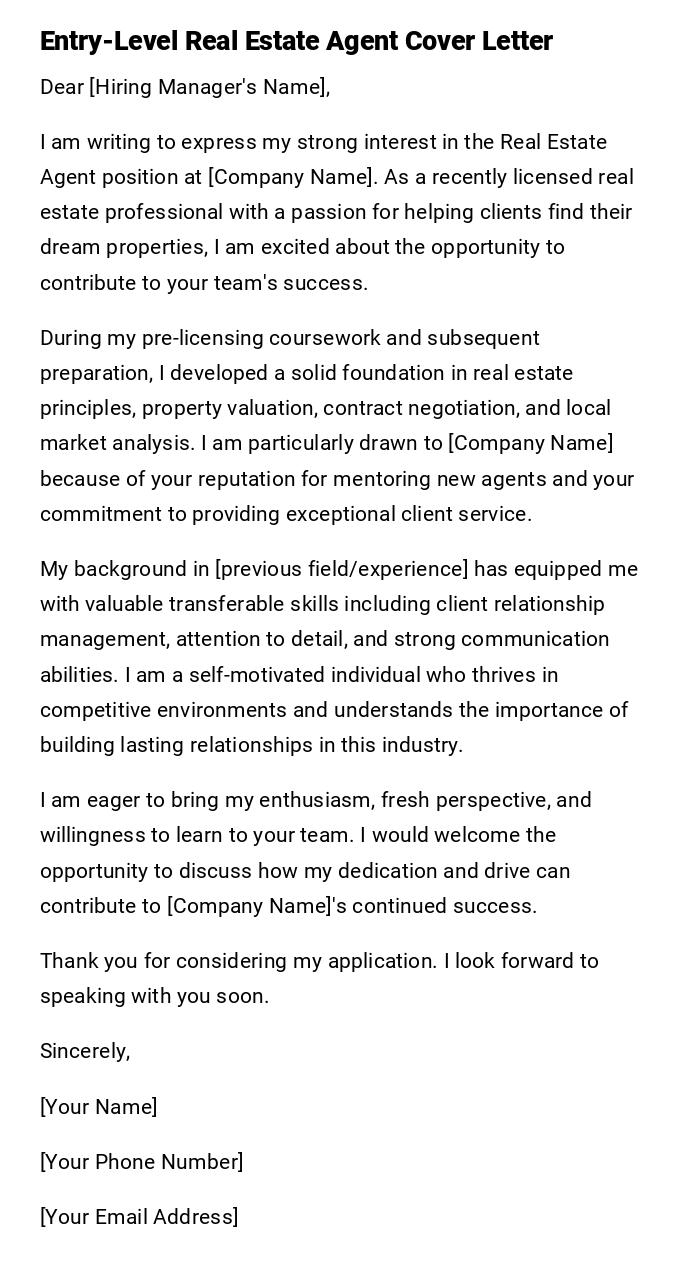
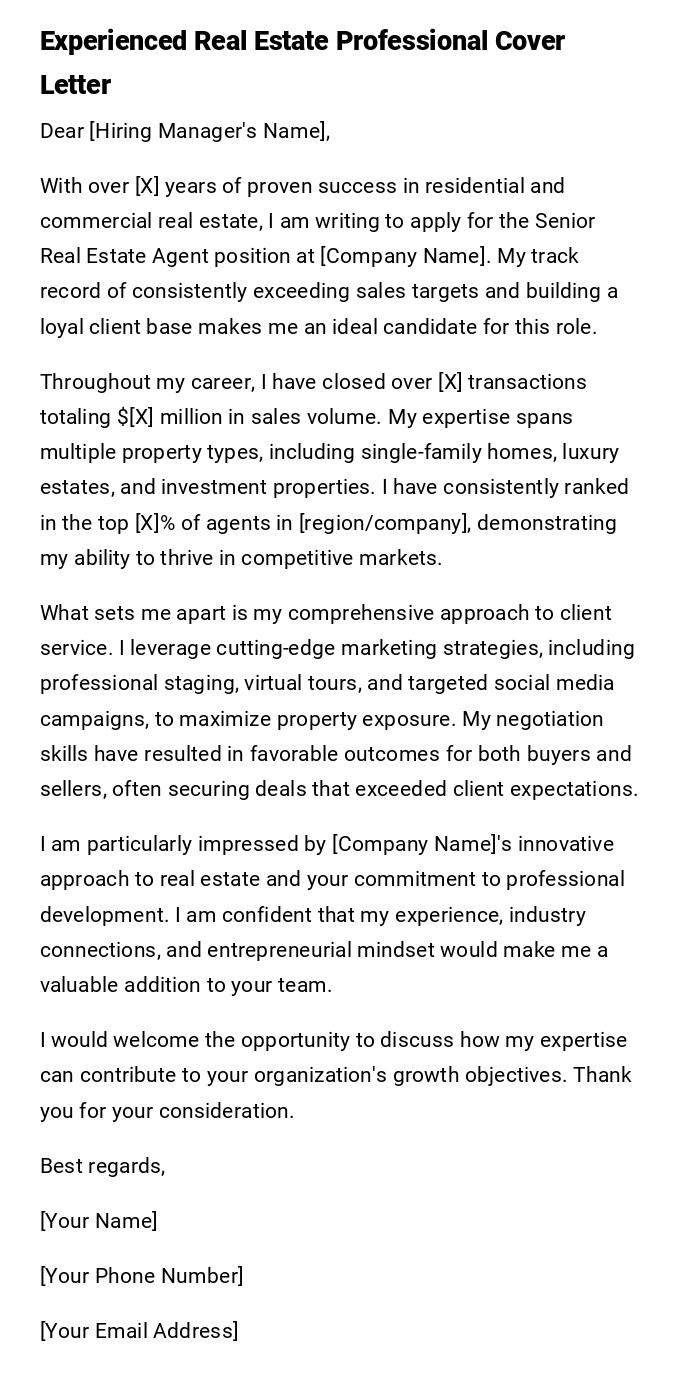
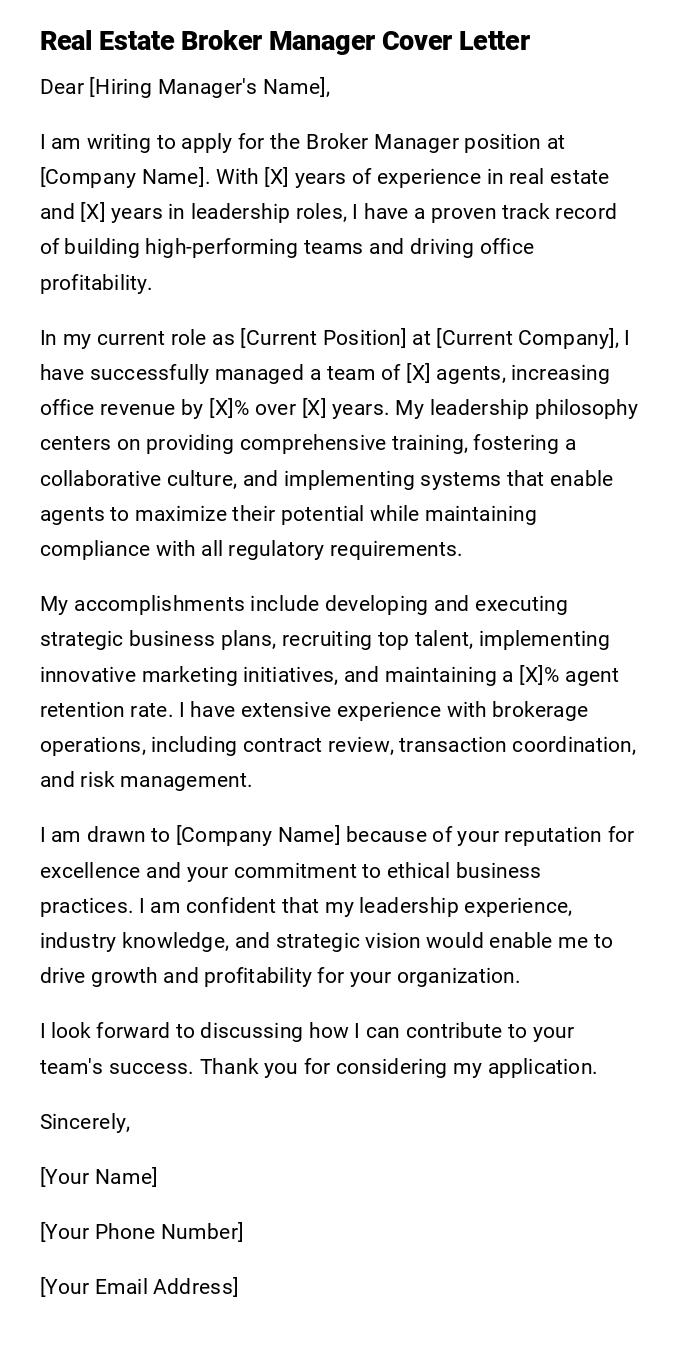
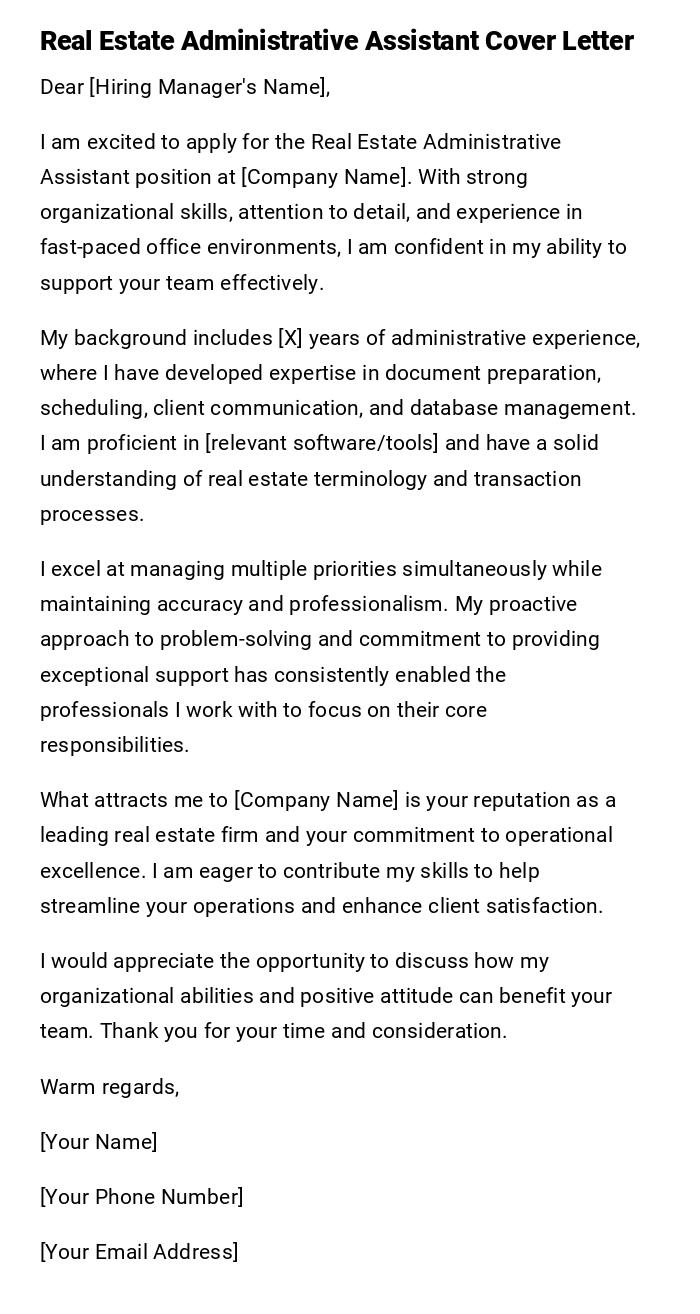
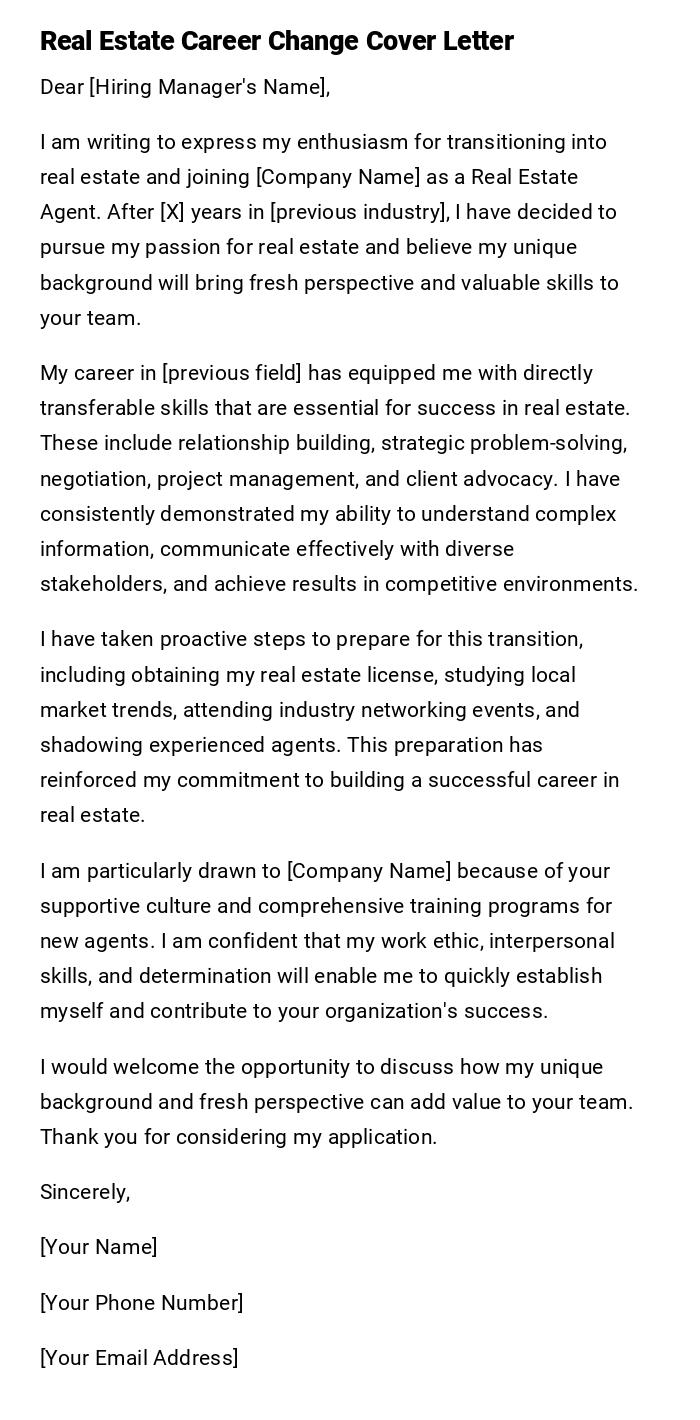
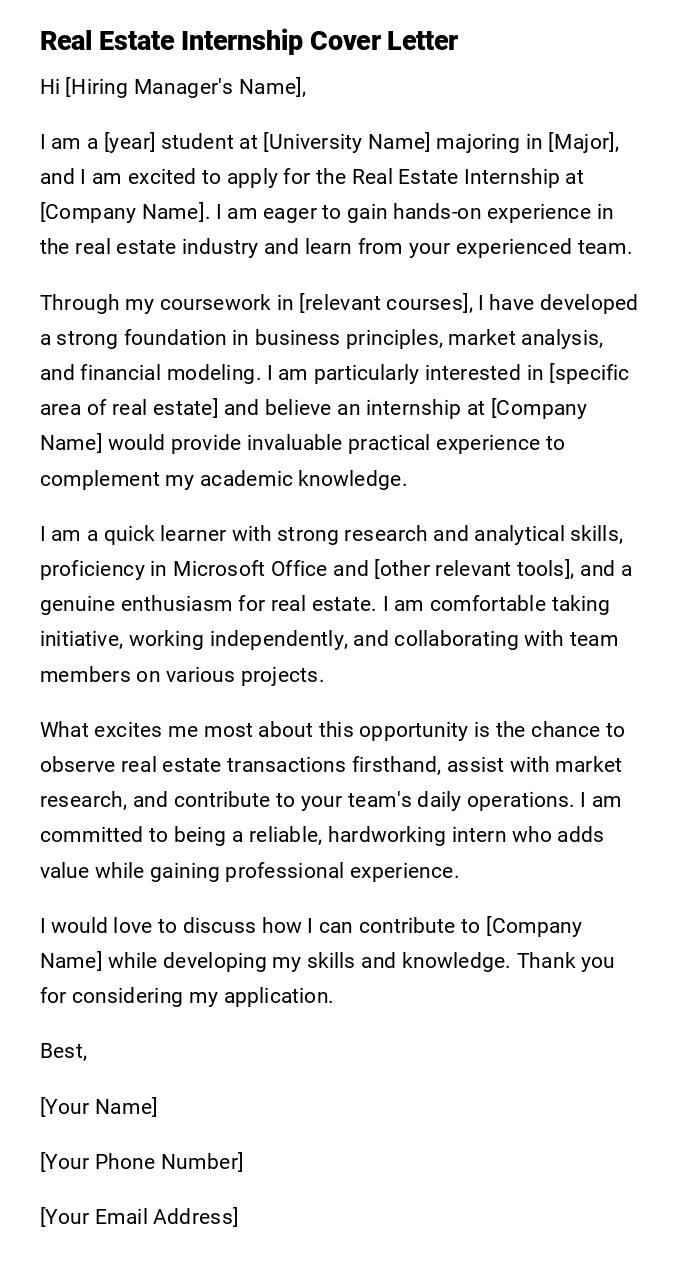
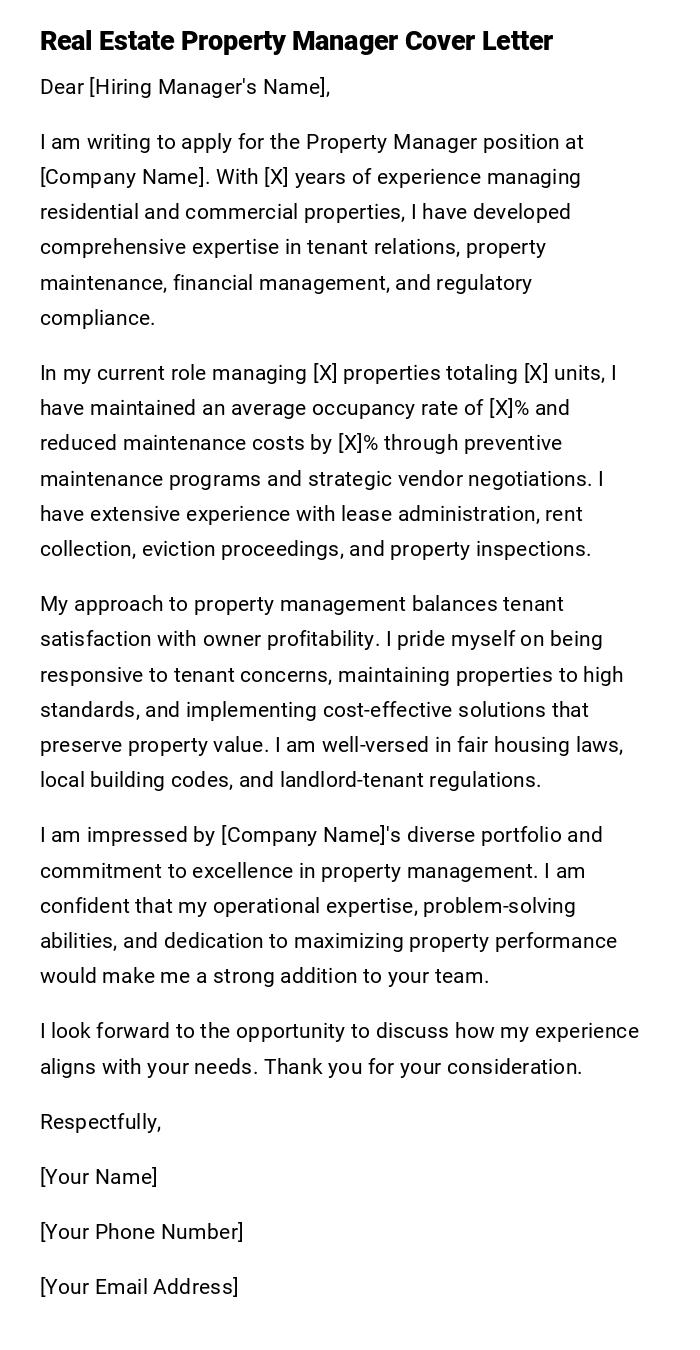
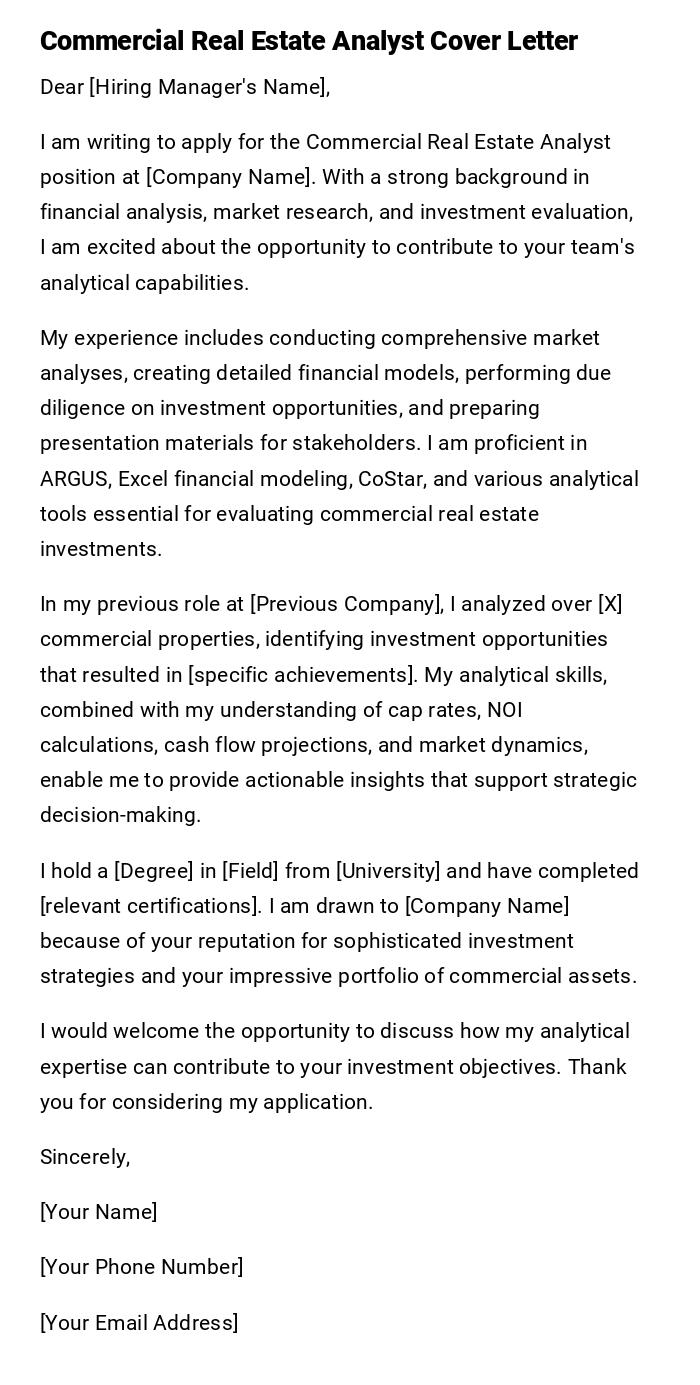

 Download Word Doc
Download Word Doc
 Download PDF
Download PDF